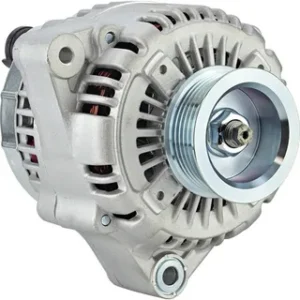The Ford Territory is a reliable and versatile vehicle, but it can face issues over time like any machine. The alternator is one of the critical components that keeps your Territory running smoothly. When this part starts to fail, it can lead to a cascade of problems that affect everything from engine performance to battery health. Knowing how to spot early warning signs can save you time, money, and frustration.
This guide will explore common indicators of a failing Ford Territory Alternator. By being aware of these symptoms, you’ll be better equipped to address potential issues before they escalate into major repairs. So buckle up as we dive into the telltale signs that your alternator may need attention!
Understanding the Alternator
The alternator is crucial in your Ford Territory. It generates electricity to power the vehicle’s electrical systems and recharge the battery while the engine is running. Without it, your car wouldn’t run efficiently.
Typically driven by a belt connected to the engine, the alternator converts mechanical energy into electrical energy using electromagnetic induction. This process ensures that all electronic components receive adequate power during operation.
A well-functioning alternator keeps your battery charged and supports various systems, including lights, radio, and air conditioning. If it starts failing, you may notice several symptoms affecting these functions.
Understanding how this essential component works can help you recognize when something isn’t quite right. Regular maintenance checks can ensure longevity, but knowing early failure signs is equally important to keep your Ford Territory running smoothly.
Symptoms of a Failing Alternator
Every Ford Territory owner should know that a failing alternator can manifest through several noticeable symptoms. One of the most common signs is dimming or flickering lights. If you notice your dashboard, headlights, or interior lights behaving erratically, it could indicate that your alternator isn’t providing consistent power.
Another alarming symptom is activating the battery warning light on your dashboard. This light serves as an early alert system for electrical issues in your vehicle. When it illuminates unexpectedly, it signals to investigate further before more serious problems arise.
Strange noises coming from the engine compartment are also worth noting. A failing alternator may produce grinding or whining sounds due to worn bearings or internal damage. These noises shouldn’t be ignored as they often point to underlying mechanical issues.
Frequent battery problems are another clear indication of an alternator issue. If you find yourself replacing batteries more often than usual, it’s time to have your Ford Territory’s alternator checked out by a professional mechanic for potential faults and repairs.
Dimming or Flickering Lights
One of the most noticeable signs of a failing Ford Territory alternator is dimming or flickering lights. When your headlights start to lose their brightness, it could indicate that the alternator isn’t providing enough power. This lack of energy affects your headlights, interior lights, and dashboard indicators.
Flickering lights can manifest at various times, especially when accelerating or decelerating. If you notice this inconsistency in lighting while driving, it’s important to take note. Initially, it may seem like a minor issue, but it often points to deeper electrical problems within the vehicle.
The fluctuation in brightness occurs because the alternator struggles to maintain a stable output as it begins to malfunction. Sometimes, you might see other electrical components acting erratically along with your lights.
Ignoring these symptoms could lead to more significant issues down the line. Keeping an eye on how your Ford Territory’s lights perform can provide critical insight into whether your alternator needs attention before things worsen.
Battery Warning Light Activation
One of the most noticeable signs that your Ford Territory alternator may fail is activating your dashboard’s battery warning light. This small yet significant indicator is an early alert system that prompts you to pay attention to potential electrical issues.
When this warning light illuminates, it’s important not to ignore it. The alternator is responsible for charging the battery and powering various electrical components in your vehicle. A flickering or constant battery light can signal that the alternator isn’t generating enough power.
You might notice that your car struggles to maintain its charge even after a jump-start. If you frequently start your engine only for the warning light to appear again shortly after, it indicates a deeper issue with your alternator’s functionality.
Prompt action is essential when faced with this symptom. Addressing the problem early could save you from being stranded or facing more expensive repairs. Once you see that warning light come on, keep an eye on any changes in how your vehicle operates—it often means trouble ahead.
Strange Noises from the Engine Compartment
Strange noises from the engine compartment can be alarming, especially if you own a Ford Territory. These sounds are often indicators that something is amiss with your alternator. If you notice unusual grinding, whining, or chirping noises while driving, paying attention is crucial.
A failing alternator may produce a distinct whirring sound as it struggles to generate power. This noise can become louder during acceleration or when electrical components are used. It could indicate that the bearings within the alternator are worn out and need replacement.
Sometimes, you might hear a high-pitched squeal. This sound typically arises from loose or damaged serpentine belts connected to the alternator. If these belts aren’t functioning correctly, they won’t allow the alternator to do its job effectively.
Ignoring strange noises can lead to further complications. It’s always best to have any concerning sounds checked by a professional mechanic before they escalate into more significant issues with your Ford Territory’s electrical system.
Frequent Battery Problems
Frequent battery problems can indicate that your Ford Territory alternator is failing. If you jump your vehicle more often than usual, it’s time to investigate further. A healthy alternator should consistently charge the battery while the engine runs.
When the alternator isn’t functioning correctly, it may not supply enough power to keep the battery charged. This can lead to unexpected dead batteries, leaving you stranded and frustrated. If you’ve replaced your battery recently and are still experiencing issues, the problem likely lies elsewhere.
Another symptom of electrical trouble is dimming lights or flickering dashboard indicators when starting your car. These signs suggest that your alternator can’t provide the stable voltage levels needed for smooth operation.
Additionally, if multiple electronic components in your Ford Territory begin malfunctioning simultaneously—like windows or radio—it could indicate an underlying issue with the charging system rather than isolated electrical faults. Keep an eye on these symptoms; they are crucial clues in diagnosing potential problems with your vehicle’s electrical system.
Electrical System Failures
When your Ford Territory’s alternator starts to fail, it can wreak havoc on the electrical system. A malfunctioning alternator doesn’t generate enough power to keep all electrical components running smoothly, leading to various issues that can be frustrating and inconvenient.
Some features begin to misbehave. For instance, your radio could cut in and out unexpectedly, or your power windows may respond sluggishly. These minor annoyances are often early signs of a deeper problem with the alternator.
Another area impacted by an underperforming alternator is the vehicle’s charging system. The battery may not receive adequate charge, so accessories like headlights and air conditioning will struggle to operate effectively. This results in a cascading effect where everything seems off-kilter.
Moreover, problems with sensors can also arise. Your dashboard lights might illuminate randomly, or warning messages about low battery voltage might appear without explanation. Such symptoms should never be ignored; they signal that your Ford Territory requires immediate attention before things worsen.
What to Watch For
When monitoring your Ford Territory alternator, identify specific signs indicating trouble. One major area of concern is the electrical system’s performance. If you notice a decline in the functionality of electronic components like power windows or dashboard lights, it could signal an alternator issue.
Another factor to consider is engine performance. A failing alternator can lead to sluggish acceleration or rough idling. These symptoms are often overlooked but can greatly affect driving experience and safety.
Watch for unusual smells, such as burnt rubber or wires, that suggest overheating within the alternator. This could pose a risk to the part and potentially compromise other vehicle systems.
Keep an eye on battery health throughout this process. Frequent jump-starts or difficulties starting your car should raise red flags about the condition of your battery and alternator. Early detection is key to avoiding more extensive repairs down the line.
Decreased Engine Performance of Replacement Alternator Ford Territory
Decreased engine performance can be a frustrating experience for any Replacement Alternator Ford Territory owner. When the alternator begins to fail, it may not supply enough power to keep the engine running smoothly. This leads to noticeable sluggishness during acceleration and could affect overall drivability.
You might also notice that your vehicle struggles during start-up or takes longer than usual to fire up. This hesitation can stem from an insufficient charge being delivered by a failing alternator, impacting vital components like the fuel pump and ignition system.
Another common sign of decreased performance is erratic idling. If your Ford Territory feels like it’s vibrating or shuddering while stationary, it’s likely due to fluctuations in electrical output affecting engine timing and control systems.
In some cases, you may even experience unexpected stalling while driving. This situation can pose serious safety risks on busy roads as it indicates that your vehicle’s electrical demands exceed what is available from a malfunctioning alternator.
Conclusion
Keeping an eye on your Ford Territory alternator can prevent unexpected breakdowns. Understanding its role in your vehicle is crucial for maintaining overall health.
If you notice dimming lights or strange sounds coming from under the hood, don’t ignore them. These symptoms often indicate that the alternator may be struggling. Early detection is key to preventing further complications.
Frequent battery issues are another red flag. If you’ve had to jump-start your car more than once recently, it might not just be a dead battery problem but a failing alternator affecting charging efficiency.
Being proactive about these signs can help ensure a smoother driving experience and prolong the life of your Ford Territory. Regular maintenance checks will enable you to catch any problems before they escalate, keeping you and your vehicle safe.
FAQs
What is the role of the alternator in my Ford Territory?
The alternator generates electricity to power the electrical systems and recharge the battery while driving. It plays a crucial role in keeping your vehicle’s electronics running smoothly.
How often should I check my alternator?
Regular checks during routine maintenance can help catch any potential issues early. If you notice symptoms like dim lights or unusual noises, it’s wise to have your alternator inspected as soon as possible.
Can I drive with a failing alternator?
Driving on a failing alternator isn’t advisable. While you may be able to continue for a short distance, eventually, it will lead to complete battery failure, leaving you stranded.
What happens if I ignore signs of a failing alternator?
Ignoring these signs can result in more severe problems, including complete engine failure due to a lack of power supply and expensive repairs that could have been avoided with timely attention.



